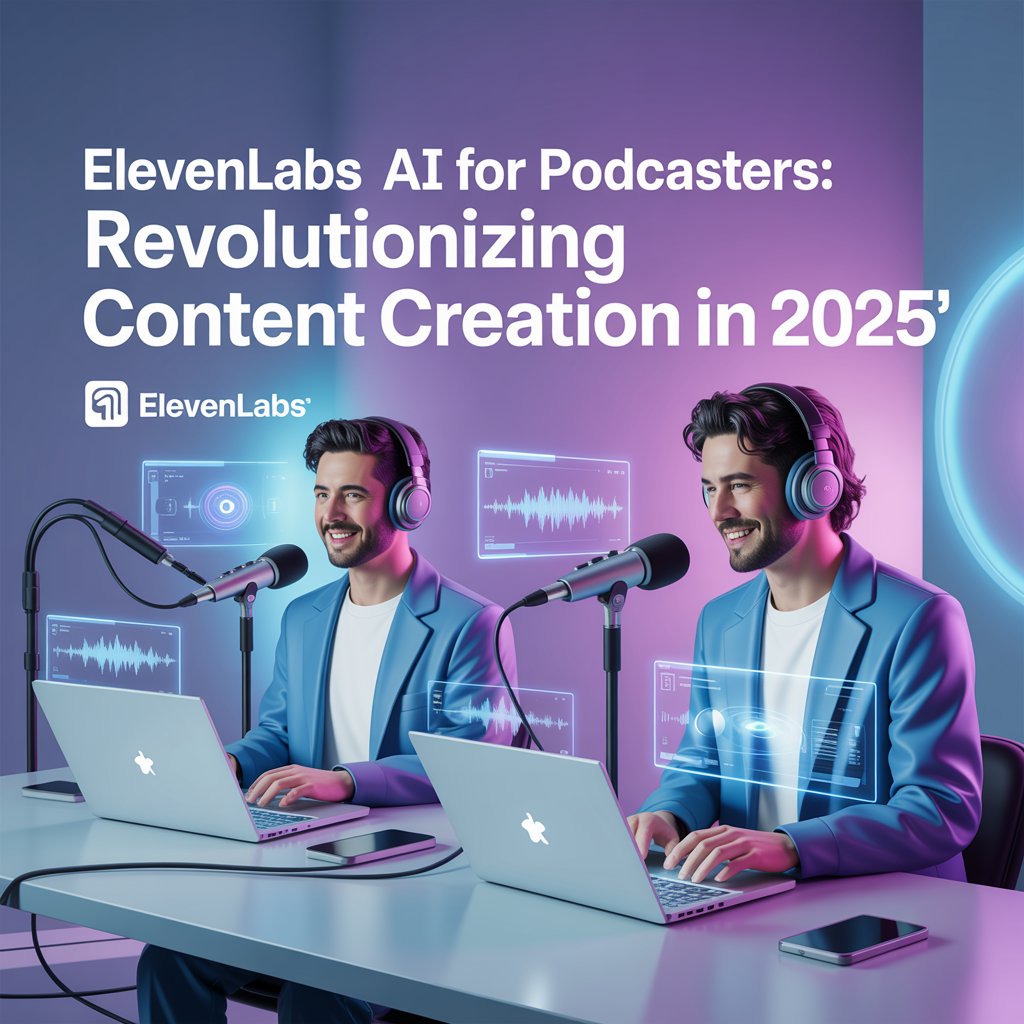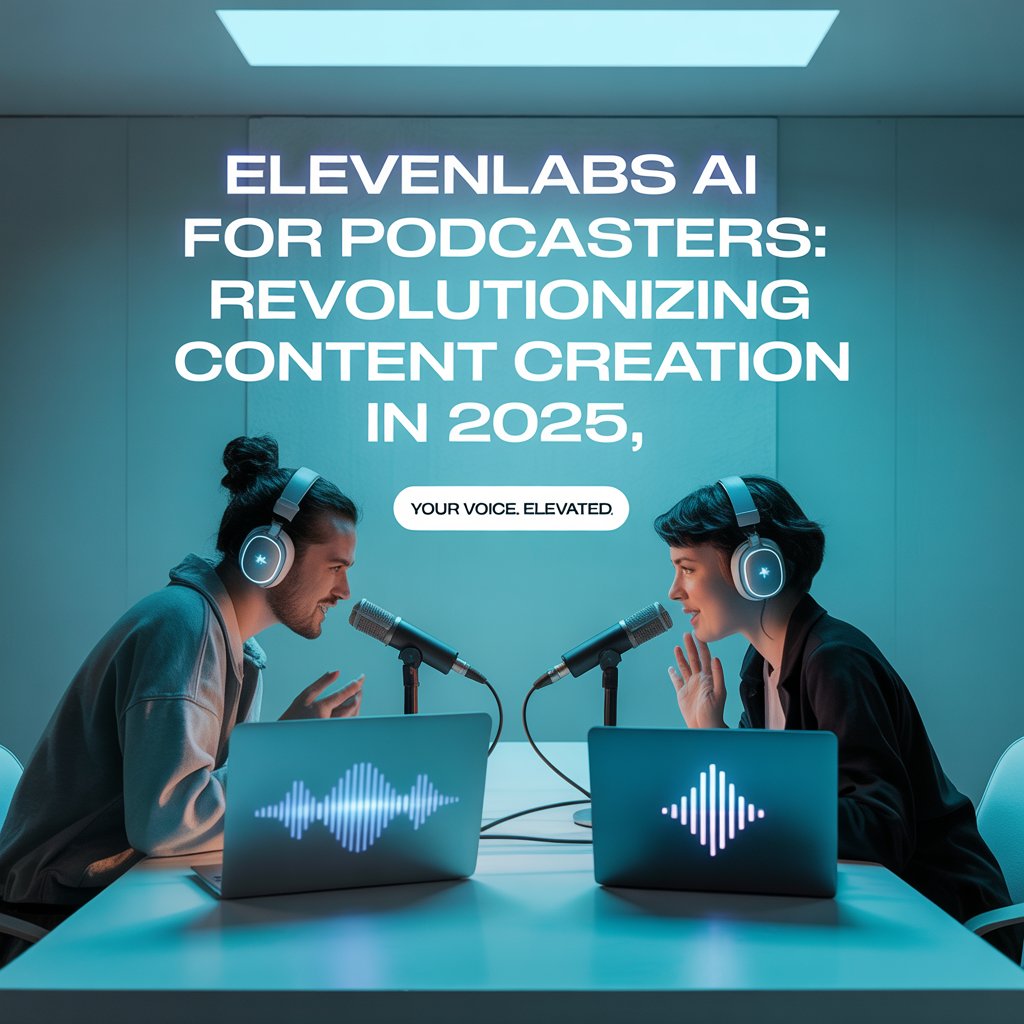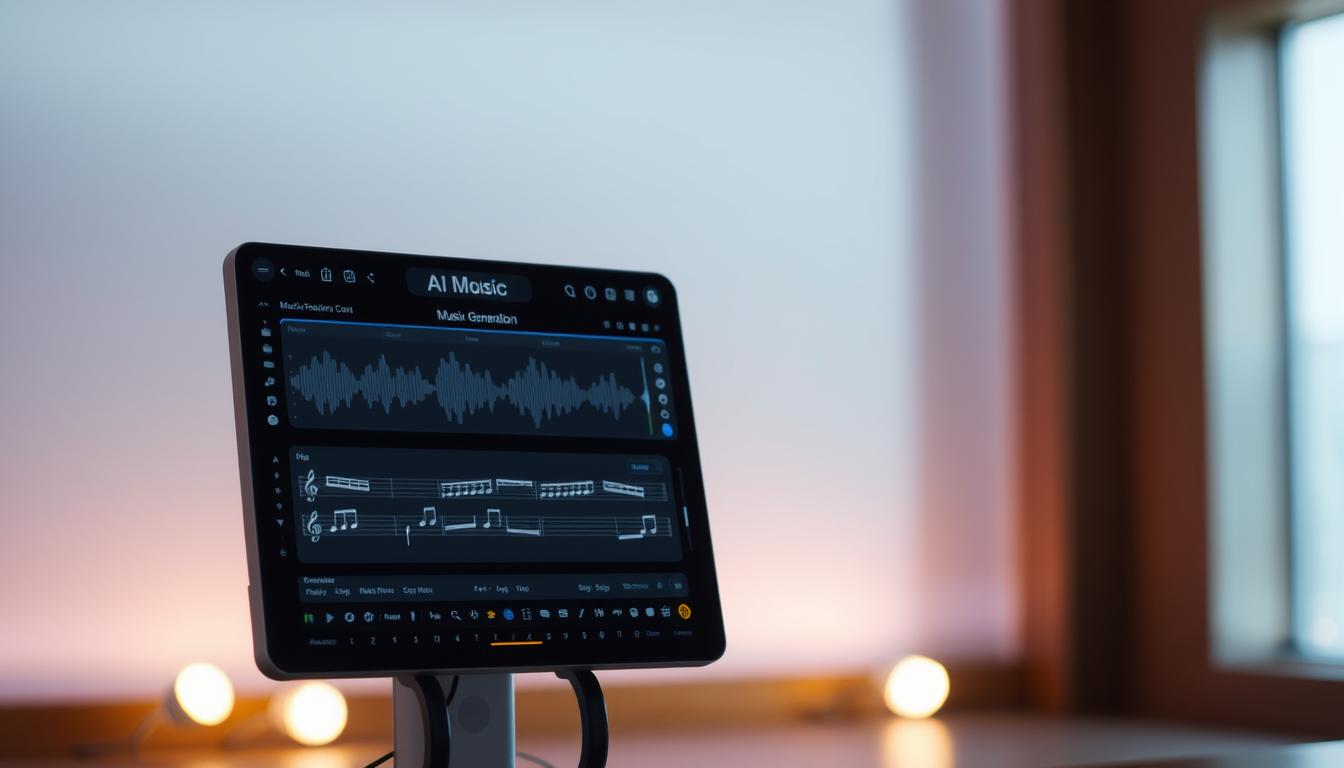Introduction
ElevenLabs AI for podcasters is changing how creators produce audio content, offering an efficient, high-quality alternative to booking studio time or hiring multiple voice actors. In 2025 many podcasters, YouTubers, educators, and marketing teams use ElevenLabs AI for podcasters to scale episodes, cut production costs, and experiment with formats that would be costly to produce by hand. This article lays out what ElevenLabs AI for podcasters can do, how to integrate it into your podcast workflow, real-world examples, best practices, and a simple way to decide whether you should try it for your next episode.
What is ElevenLabs AI and How Does It Work?
ElevenLabs is an AI-driven platform that specializes in advanced speech synthesis and voice cloning, designed for creators who need realistic, expressive audio. Behind the scenes it uses neural text-to-speech (TTS) models trained to capture prosody, phonetics, and intonation so the generated audio sounds like natural speech rather than flat, robotic narration. Creators use the ElevenLabs voice generator to turn written content into high-quality audio for podcasts, YouTube narrations, audiobooks, and more.
- Technology: Neural TTS architectures with fine-grained prosody controls, emotion markers, and voice cloning pipelines that let creators shape tone, pacing, and emphasis.
- Capabilities: Generate new voices from ElevenLabs’ library, create a cloned voice (with required consent and verification), or convert text into expressive speech. The platform exposes controls for pitch, speed, and emotional intensity; the API supports programmatic text-to-speech for automated podcast production.
- Benefits for creators:
- Rapid iteration on podcast scripts and narration—test variations in minutes.
- Access to multiple distinct voices without hiring actors, helpful when you need multiple speakers or characters.
- Consistent, high-quality audio across episodes, which simplifies post-production and branding.
Why Podcasters Are Turning to ElevenLabs AI
Podcasters are adopting ElevenLabs because it addresses several production pain points at once: speed, cost, consistency, and creative flexibility. Whether you’re publishing daily news updates, serialized fiction, or longform interviews, AI-generated voices let small teams and solo creators produce more polished episodes without proportionally increasing time or budget.
- Faster production: ElevenLabs turns a finished script into broadcast-ready audio in minutes, shortening podcast production cycles — ideal for news-style shows, daily updates, and serialized storytelling where speed matters.
- Lower costs: For many creators, using ai-generated voices is more affordable than recurring studio time or multiple freelance speakers, making it easier to increase episode frequency without blowing the budget.
- Consistent, professional voice quality: After you tune a voice profile, you get repeatable tone, pacing, and timbre across episodes, promos, and spin-offs — which helps with branding and listener experience.
- Flexibility: Quickly adjust voice characteristics to match episode tone — conversational for interviews, dramatic for fiction, or instructional for educational content. This makes it simple to test new formats or use secondary voices for segments and characters.
Step-by-Step Guide: How to Use ElevenLabs AI for Podcasters
Follow these steps to incorporate ElevenLabs AI into your podcast workflow:
- Setting up an account
- Sign up on the ElevenLabs platform and pick a plan that matches your expected usage—many podcasters start with a trial to test voice quality and API limits.
- Prepare the required verification for voice cloning: ElevenLabs typically asks for consent documentation and short audio samples when creating a cloned voice—use a 1–3 minute clear recording as a recommended starting point.
- Choosing the right voice
- Browse the ElevenLabs voice library and sample voices by gender, age, and style. Pick a primary voice that matches your show’s brand and a secondary voice for segments or characters.
- Quick tip: test 30–60 second script samples for each candidate voice to compare presence, clarity, and emotional fit before committing.
- Customizing tone, style, and pacing
- Use ElevenLabs controls to tweak pitch, speed, and emotional intensity. Add inline cues in your podcast script (for example: [emphasize], [pause 0.5s], [soft tone]) to guide prosody.
- Iterate with short test scripts (30–90 seconds) and refine voice parameters until the vocal personality matches your brand.
- Exporting audio for podcast editing
- Export narration as high-quality WAV (44.1–48 kHz, 16–24 bit) or MP3 depending on your editing chain. WAV is preferred for mastering and best audio quality.
- Import into your DAW (Audacity, Adobe Audition, Reaper, etc.) for final editing—add music beds, level-match your voice with interviews, and run a final limiter for consistent loudness.
- Integration tips
- Mark your script with timing and breathing cues so the TTS engine inserts natural pauses. Example script cue: “Welcome back to the show. [pause 0.6s] Today’s guest is…”
- Stitch AI narration with recorded interviews or host segments for a hybrid workflow—use EQ and subtle reverb to glue synthetic voices to real recordings.
- Troubleshooting checklist: confirm pronunciations (provide phonetic spellings if needed), shorten or lengthen pauses to fix pacing, and run a short audience test episode before full rollout.
ElevenLabs AI for Content Creation Beyond Podcasts
More and more creators are discovering how ElevenLabs AI for podcasters enhances their workflow, making the podcast production process smoother and more efficient.
With ElevenLabs AI for podcasters, the barriers to entry for quality audio content have diminished, giving every creator the tools they need to succeed.
ElevenLabs isn’t just for podcasts — creators use the platform to turn written content into polished audio across multiple verticals. Below are common use cases with a quick workflow suggestion you can follow today.
Incorporating ElevenLabs AI for podcasters into your routine can lead to remarkable improvements in efficiency and creativity.
When looking for a voice solution, consider how ElevenLabs AI for podcasters can meet your specific needs and streamline your workflow.
Many users report that ElevenLabs AI for podcasters significantly reduces their production time, allowing them to focus on content quality.
ElevenLabs AI for podcasters provides a unique advantage for creators who want to maintain a professional audio standard.
- Audiobooks: Produce multi-voice audiobooks without coordinating multiple narrators. Workflow: script → assign voices per character → generate 30–60s samples → export WAV → QA for pacing and character consistency. (Tip: test character voices side-by-side to ensure clear differentiation.)
- YouTube narrations: Fast-turnaround voiceovers for explainers, tutorials, and longform commentary — use ElevenLabs for YouTubers to convert written scripts into voiceovers quickly. Workflow: write or repurpose written content → pick a narration voice → tweak pacing → export and sync with video edits.
- Marketing campaigns: Create voice ads, social audio snippets, or IVR messages with a branded voice profile. Workflow: craft short ad scripts → select a branded voice → run A/B tests with different tones → export MP3s for distribution or ad platforms.
- E-learning content: Generate consistent module narration for courses, training, and accessibility features. Workflow: break course content into modules → batch-generate narration for each lesson → standardize pacing and audio quality for a cohesive learner experience.
Best Practices for Using ElevenLabs Voice Generator
To get the most natural, engaging results from ElevenLabs, apply these practical tips — they help preserve audio quality and listener experience while keeping your podcast production efficient.
- Avoid monotone output: Use explicit expressive cues in your podcast script — for example, [emphasize], [pause 0.5s], [softly], or [energetic]. Combine those cues with ElevenLabs’ emotion markers and prosody controls to vary pitch, pacing, and intensity.
- Use background music to enhance storytelling: Add subtle ambient beds, transitions, or stings to increase perceived naturalness. Keep music levels low (-18 to -24 LUFS under voice) so the voice remains clear and the episode retains professional audio quality.
- Combine AI with human editing: Human editors add the final polish — fix mispronunciations (provide phonetic spellings if needed), insert micro-pauses, and smooth breath timing. Treat AI narration like a performance to be edited, not a finished master.
- Keep ethics and transparency in mind: Disclose AI-generated speech when appropriate and secure explicit consent for any voice cloning. Follow platform and legal guidance for attribution and licensing to avoid compliance issues.
- Iterate with small test batches: Run 30–90 second test samples to finalize voice settings and post-processing. QA checklist: correct pronunciations, natural pause timing, matched loudness, and realistic breath placement. Only scale once the test passes audience or team review.

Pros and Cons of ElevenLabs AI Content Creation
- Pros
- Time-saving: Rapid generation of narration shortens podcast production cycles so creators can publish more frequently.
- Scalable: Easily produce multiple episodes, create language variants, or localize shows without coordinating many human voice actors.
- Affordable: For many small teams and solo creators, AI-generated voices cost less than recurring studio rates or hiring multiple voice talents.
- Consistent quality: Once you establish a voice profile and post-processing chain, audio quality and voice characteristics stay stable across episodes and campaigns.
- Cons
- Ethical debates: Voice cloning, consent, and attribution remain active issues — creators should establish consent processes and disclose AI use where appropriate.
- May lack full human emotion: While ElevenLabs voices are highly realistic, they can still miss subtle emotional nuances a skilled human performer provides for demanding dramatic roles.
- Legal & licensing considerations: Commercial use, cloning permissions, and licensing terms vary by platform and region; review ElevenLabs’ terms and any relevant rights before publishing.
Comparing ElevenLabs AI with Other Voice Generators
When evaluating ElevenLabs against other platforms, focus on three practical factors that affect podcast production and ROI:
- Naturalness and prosody controls: ElevenLabs is often praised for realistic voices and nuanced prosody controls (emotion markers, pacing), which can outperform generalized TTS tools when your goal is a high-quality podcast or narrative audio.
- Pricing and licensing: Compare tiered plans and production credit models — ElevenLabs typically offers cloning and commercial licensing options at higher tiers; map expected episode volume to plan limits to estimate costs accurately.
- Flexibility and creator tools: ElevenLabs emphasizes fine-grained controls and creative workflows (API access, emotion markers, cloning safeguards) making it especially useful for storytelling, serialized podcast production, and creators who need multiple voices.
Real Examples of ElevenLabs AI in Podcasting
- Case study: Small serialized fiction podcast
- A two-person team used ElevenLabs to voice minor characters and speed weekly episode production. Before: hiring multiple actors and coordinating recording schedules; after: AI voices handled small roles, letting the team release episodes more frequently and polish mixes without extra casting overhead.
- Case study: Educational series for E-learning
- An independent educator converted written course modules into narrated lessons using ElevenLabs. Workflow: batch-generate narration per module → standardize pacing → export WAVs → integrate into LMS. Result: more consistent narration across lessons and faster course updates (illustrative time-savings reported by creators often fall in the 30–60% range depending on workflow).
- How small creators scale with AI voices
- Solo creators use ai-generated voices to test new formats—bonus episodes, promos, mini-series—without committing to expensive production. The typical approach: draft a podcast script, generate short samples, run a listener test, then generate full episodes once the voice and pacing are approved.
ElevenLabs Creative Use Cases
- Character-driven audio dramas: assign distinct AI voices to roles and adjust pitch, pacing, and emotion markers so listeners can distinguish characters without extra voice actors.
- Rapid localization: translate scripts and generate voiceovers in multiple languages to reach new audiences (test translations with native speakers for cultural nuance).
- Episodic recaps and promos: generate short, consistent summaries or promo clips using the same host voice for brand continuity.
- Branded voice identity: create and standardize a signature voice for a podcast network or channel, useful for cross-show promos and ads.
AI Voiceover Tools 2025 — The Landscape
In 2025 the AI voiceover ecosystem spans specialized platforms like ElevenLabs, TTS offerings from major cloud providers, and niche startups focused on real-time voice conversion or low-latency speech tools. Each class of provider serves different podcast production needs — from one-off narration generation to fully automated, programmatic podcast production pipelines.
- Voice realism and prosody controls: If your priority is a high-quality podcast or narrative audio, choose a platform with fine-grained prosody, emotion markers, and pronunciation controls to achieve natural-sounding voices.
- Licensing and commercial use terms: Review cloning policies, commercial licensing, and any limits on redistribution. Some providers include commercial rights in higher tiers, while others require separate licensing for ads or paid content.
- Ease of integration with workflows: Evaluate API support, batch generation, file formats (WAV/MP3), and direct integrations with editing tools or content platforms to streamline podcast production.
- Model updates and vendor support: Platforms that actively update models and offer responsive support can improve audio quality and reduce long-term maintenance.
ElevenLabs is frequently recommended for creators who need a balance of high-quality voices, creative controls, and cloning safeguards. That said, whether you should choose ElevenLabs or another provider depends on your specific needs — volume, budget, localization, and legal requirements.
Final Thoughts – Is ElevenLabs AI Worth It for Podcasters?
ElevenLabs AI is a strong option for podcasters, YouTubers, and content creators who need scalable, high-quality voice production. It’s particularly well-suited for solo creators and small teams looking to produce more episodes, serialized fiction producers who need consistent voices, and video creators who require fast narration for frequent uploads.
- Quick decision checklist: Prioritize (1) audio quality and prosody controls, (2) licensing for commercial use and cloning, (3) integration with your editing workflow (API/batch exports), and (4) predictable pricing for expected episode volume.
Recommendation: trial ElevenLabs on a pilot episode or short series. Try a demo voice, run a 30–90 second test script, measure audience feedback (listening time, retention, and subjective quality), and compare total cost to your current production spend before committing to a full migration.
Ultimately, whether you choose ElevenLabs or another solution depends on your production goals, legal requirements, and the balance between automation and human oversight you’re comfortable with. As speech technology evolves through 2025, ElevenLabs remains a leading platform for creators who need realistic voices and flexible tools to generate podcast episodes and broader audio content.
As you explore options, remember that ElevenLabs AI for podcasters is continually evolving to meet user demands.
Leveraging ElevenLabs AI for podcasters can provide you with the speed and flexibility needed for modern content creation.
In summary, ElevenLabs AI for podcasters is a game-changer for anyone looking to enhance their audio production quality.
Consider giving ElevenLabs AI for podcasters a try; it may just transform your approach to audio content.
Ultimately, ElevenLabs AI for podcasters stands out for its quality and efficiency, making it a top choice for creators.
With the advancements in ElevenLabs AI for podcasters, the possibilities for creative audio production are expanding.
As we move forward, embracing ElevenLabs AI for podcasters could be the key to successful content creation.






I’ve learn a few good stuff here. Definitely value bookmarking for revisiting. I surprise how a lot attempt you set to create this kind of excellent informative site.